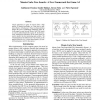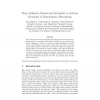1511 search results - page 115 / 303 » On the effectiveness of address-space randomization |
AIIDE
2008
13 years 10 months ago
2008
Classic approaches to game AI require either a high quality of domain knowledge, or a long time to generate effective AI behaviour. These two characteristics hamper the goal of es...
IWUC
2004
13 years 9 months ago
2004
There is an inherent chasm between the real-world and the world that can be perceived by computer systems, yielding uncertainty and ambiguity in system perceived context, with cons...
CORR
2008
Springer
13 years 8 months ago
2008
Springer
The Karmarkar-Karp differencing algorithm is the best known polynomial time heuristic for the number partitioning problem, fundamental in both theoretical computer science and stat...
CONNECTION
2006
13 years 8 months ago
2006
This article describes a developmental system based on information theory implemented on a real robot that learns a model of its own sensory and actuator apparatus. There is no in...
CONNECTION
2006
13 years 8 months ago
2006
By learning a range of possible times over which the effect of an action can take place, a robot can reason more effectively about causal and contingent relationships in the world...


